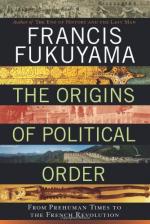|
This section contains 463 words (approx. 2 pages at 400 words per page) |

|
The Origins of Political Order: From Prehuman Times to the French Revolution Summary & Study Guide Description
The Origins of Political Order: From Prehuman Times to the French Revolution Summary & Study Guide includes comprehensive information and analysis to help you understand the book. This study guide contains the following sections:
This detailed literature summary also contains Topics for Discussion and a Free Quiz on The Origins of Political Order: From Prehuman Times to the French Revolution by Francis Fukuyama.
The Origins of Political Order is the first of two planned volumes by Francis Fukuyama examining how civilizations develop political institutions and what factors drive the direction of political development. He covers a period stretching from pre-history up to the late 18th century just prior to the French Revolution.
Fukuyama differs from some of the prevailing writers on political organization in that he does not assume that humans intentionally constructed their first social order. He finds biological evidence by comparison with modern chimpanzees that humans are naturally social animals who have always banded together even before organizing politically.
Fukuyama identifies three key elements of modern democracy as the presence of a strong state, a concept of the rule of law, and an accountable government. He traces the development of these three elements separately in a comparative look at the civilizations of ancient China, India, the Middle East and Europe. China was the first civilization to move from tribal organization into statehood, but while it had a strong central authority, Fukuyama argues, it never developed a rule of law or accountable government. India, by comparison, had a strong tradition of a rule of law handed down by the Hindu Brahmin priests, however it retained much of its kinship-based social organization and never developed a strong central authority. In the Middle East, the Ottoman Empire had religious rule of law and a strong central authority, but this authority was so intertwined with the religious authority that its political development was constrained.
It was in England that the three key elements first came together to form a modern democracy, Fukuyama argues. England had both the strong social organization and strong central authority that was independent from religious authority. When the English Parliament deposed James II and instated William III on the throne, it took the first major step toward being ruled by a sovereign assembly directly accountable to the people.
Fukuyama argues that the hierarchical bureaucracy of the Catholic Church was a model for state builders. It also played a key role in developing the concept of a rule of law, which was adopted in the political realm. When the Church became independent from the Holy Roman Empire under Pope Gregory, it freed the states of Europe to develop complex political organizations.
Fukuyama finds evidence of these modern state institutions existing even in the earliest states, although at different levels in different places at different times. By following these threads individually through history, he hopes to develop a method for examining modern political development. He explains that since the Industrial Revolution the world economic situation has changed drastically and that this must be accounted for in examining modern political development. This will be the subject of the second volume of the work.
Read more from the Study Guide
|
This section contains 463 words (approx. 2 pages at 400 words per page) |

|



